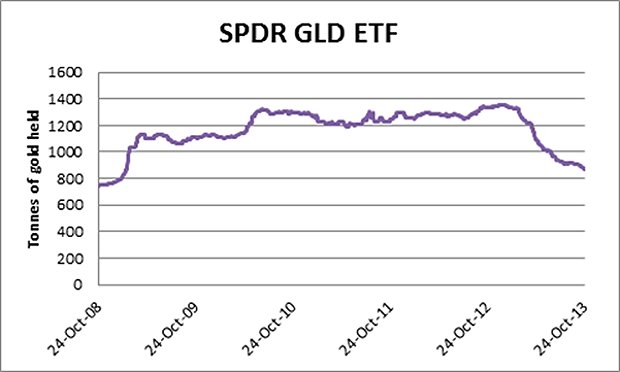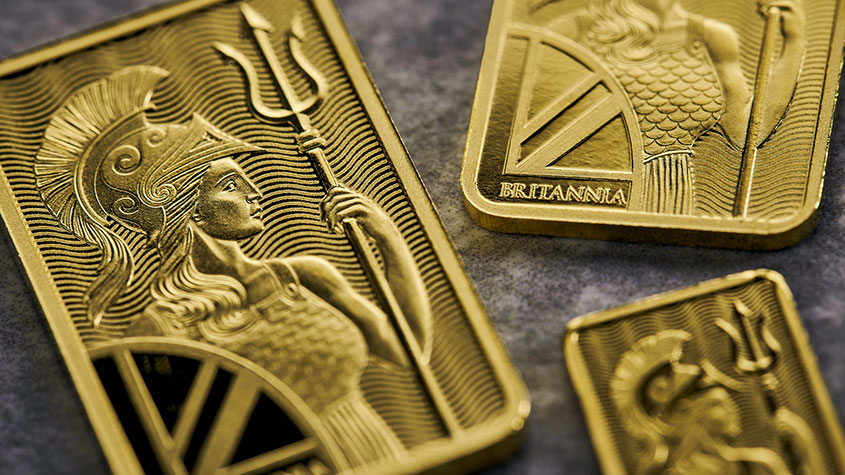Sprott calls out the World Gold Council
Accusations of a critical shortfall in gold have rocked the market, says Simon Popple. And if right, it can only mean one thing for the gold price.
Get the latest financial news, insights and expert analysis from our award-winning MoneyWeek team, to help you understand what really matters when it comes to your finances.
You are now subscribed
Your newsletter sign-up was successful
Want to add more newsletters?

Twice daily
MoneyWeek
Get the latest financial news, insights and expert analysis from our award-winning MoneyWeek team, to help you understand what really matters when it comes to your finances.

Four times a week
Look After My Bills
Sign up to our free money-saving newsletter, filled with the latest news and expert advice to help you find the best tips and deals for managing your bills. Start saving today!
As I'm sure you're aware, there's been some interesting activity in the gold market of late. Despite the lack of tapering and fundamentals screaming for a higher price progress to date has been somewhat muted. At the close on 1 November, the price reads $1,307.
Needless to say, we're still contrarian investors. And there are plenty in the market trying to talk the price down. Goldman Sachs recently went out on a bit of limb predicting a fall in the gold price to $1,144 per ounce in 2014. But their rationale for lower prices looks feeble.
It rests on improving US economic data, rising real rates and tapering of quantitative easing (QE). I don't see any of those things happening (and I don't think the market does either).
MoneyWeek
Subscribe to MoneyWeek today and get your first six magazine issues absolutely FREE

Sign up to Money Morning
Don't miss the latest investment and personal finances news, market analysis, plus money-saving tips with our free twice-daily newsletter
Don't miss the latest investment and personal finances news, market analysis, plus money-saving tips with our free twice-daily newsletter
There are now so many elephants in the room we're starting to run out of space! Soaring demand from China, India and Russia. No tapering of QE on the horizon (in fact, it looks like they'll probably print more). Falling gold supply. And finally, gold pouring out of the Comex and exchange-traded funds (ETFs).
But the story in gold right now is the delicate balance between demand and supply. And in particular, some recent analysis from Sprott Asset Management that really set the cat amongst the pigeons.
Sprott's analysis is based on the global supply and demand of gold. Basically, it accuses Thomson Reuters and the World Gold Council (WGC) of understating the gold supply shortfall relative to gold demand. Here is its analysis:
| Mine production | 1,383 | 2,765 | GFMS |
| less Chinese domestic production | 270 | 440 | China Gold Association |
| less Russian domestic production | 122 | 183 | WBMS |
| Total mine production excluding China & Russia | 991 | 2,142 | Row 3 - Cell 3 |
| Hong Kong net exports to China | 716 | 1,074 | Hong Kong Census |
| Net imports to Hong Kong | 471 | 707 | Hong Kong Census |
| Thailand - net imports | 157 | 313 | UN Comtrade statistics |
| Turkey - net imports | 124 | 248 | UN Comtrade statistics |
| India - net imports | 551 | 1,102 | UN Comtrade statistics |
| Central Banks - change in reserves | 216 | 431 | IMF |
| Other countries - jewellery, coin and bar demand | 655 | 1,309 | GFMS |
| Total demand | 2,890 | 5,184 | Row 11 - Cell 3 |
| Gold recycling | 672 | 1,344 | GFMS |
| ETF outflows | 724 | 917 | Bloomberg |
Source: Sprott Global
This is incredible. It's estimating total demand for this year of 5,184 tonnes against mine supply (excluding China and Russia who don't export any of their production) of just 2,142. Adding back scrap and ETF outflows, we get to 4,403 tonnes which still leaves a chunky 781-tonne shortfall.
In an open letter to the World Gold Council, Sprott said "demand statistics reported by the World Gold Council... consistently misrepresent reality, mostly with regard to demand from Asia."
Now, clearly the World Gold Council and Thomson Reuters GFMS aren't happy. Here's what they had to say:
"The use of import data as a proxy to measure gold demand is somewhat simplistic and does not take into account factors such as round-tripping and stocking/destocking... To effectively measure gold demand, a more detailed holistic analysis is required."
Thomson Reuters GFMS said it stood by its 2013 supply and demand gold estimates. The figures were "based on highly detailed on-the-ground analysis by a large team of analysts based around the world and which are figures supported by experts at the World Gold Council".
I'm not close enough to the information to decide who's right on this. But it's a real eye-opener to read a respected source like Sprott calling the WGC's credibility into question. Anyway, form your own view.
The gold ATMs
Here's a graph showing the movement of physical gold from SPDR GLD (the largest physically backed gold ETF in the world) over the past five years:

Source: SPDR GLD
Holdings have plummeted from 1,353 tonnes on 10 December 2012 to 872 tonnes on 25 October 2013 - a drop of 481 tonnes.
If this decline continues, then this route to physical gold won't be around for very long. With gold increasingly moving east and falling into the strong hands of those with no interest in selling, and more importantly, no need to sell it, it's very difficult to see how the market will cope with ever increasing demand.
I know I keep banging on about it, but when you have a material lack of supply and rising demand, the price is only going to go one way.
Get the latest financial news, insights and expert analysis from our award-winning MoneyWeek team, to help you understand what really matters when it comes to your finances.
Simon is an expert in investing in gold and commodities which he shares for our MoneyWeek readers. He studied at the University of Surrey where he achieved a business degree and a marketing diploma. After taking his studies further and doing an MBA at Birmingham University, Simon was the first MBA student offered an internship in the U.S. Since then, Simon has been a part of the Senior Banker team at ABN Amro where he became the founding member of their Financial Sponsors team, and then joined Strutt and Parker Financial Services where he was appointed as Head of Investment Management. He also became a director at one of the world’s biggest private property companies, Topland. Simon Popple has written for MoneyWeek and Agora Financial.
-
 Should you buy an active ETF?
Should you buy an active ETF?ETFs are often mischaracterised as passive products, but they can be a convenient way to add active management to your portfolio
-
 Power up your pension before 5 April – easy ways to save before the tax year end
Power up your pension before 5 April – easy ways to save before the tax year endWith the end of the tax year looming, pension savers currently have a window to review and maximise what’s going into their retirement funds – we look at how
-
 Diagnosing cancer more deftly will pay dividends
Diagnosing cancer more deftly will pay dividendsGiven that 50% of Britons will develop cancer during their lifetimes, we need to get better at detecting it, says Matthew Partridge. These firms are leading the technological charge.
-
 Protect against inflation with Britannia gold coins and bars
Protect against inflation with Britannia gold coins and barsAdvertisement Feature With UK inflation at a 40-year high and expected to rise even higher, interest in physical gold is surging once again. And The Royal Mint’s Britannia gold coins and bars offer an accessible and affordable way to buy.
-
 Commodity prices are taking a breather
Commodity prices are taking a breatherNews Commodity prices have fallen back after spiking early in the year. Iron ore is down 36% from its March peak, while copper has lost 20% since 1 January. And there could be further falls to come.
-
 Seoul attempts to close the “Korea discount” for stocks
Seoul attempts to close the “Korea discount” for stocksNews South Korean stocks suffer from the “Korea discount” – with the country still classified as an emerging market, investors are reluctant to pay a premium.
-
 Upcoming IPOs in 2022: which companies are planning to list this year?
Upcoming IPOs in 2022: which companies are planning to list this year?News Rupert Hargreaves explains what an IPO is, how public and private companies differ, and picks out some of the more notable companies set to list on the stock exchange this year.
-
 Five dividend stocks to beat inflation
Five dividend stocks to beat inflationTips Rupert Hargreaves looks at five stocks to beat inflation that should help protect your wealth
-
 Metals prices wobble on slowdown fears
Metals prices wobble on slowdown fearsNews The S&P GSCI index of 24 major raw materials has fallen back 9% since mid-June on growing fears of a recession, and copper has hit a 16-month low after losing 22% since a peak in early March.
-
 How to invest in the copper boom
How to invest in the copper boomTips The price of copper has slipped recently. But that’s temporary – the long-term outlook is very bullish, says Dominic Frisby. Here, he explains the best ways to invest in copper.